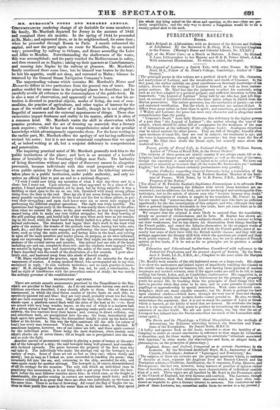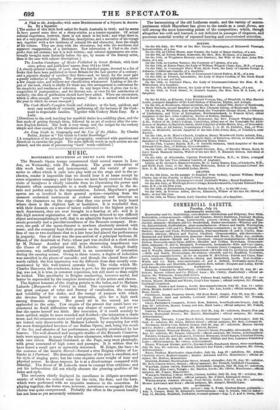PUBLICATIONS RECEIVET.
Bowes.
Sale's Brigade in Afghanistan; with an Account of the Seizure and Defsuip of Jellallabad. By the Reverend G. R. Gleig, M.A., Principal Chaplets
to the Forces. (Murray's Home and Colonial Library, No. X.XXIV.)
Lffe at the Water Cure; • or a Month at Malvern. A Diary. By RichertJ. J. Lane, Lithographer to her Majesty and H.R. H. Prince Albert, A..11.#. With-numerous Illustrations. To which is added, the Sequel.
The Legend of Latimer; a Zurich Tale; with other Poems. By Willis' Nind, M.A., Fellow of St. Peter's College, Cambridge; Author of " Oratory." [The principal poems in this volume are a poetical sketch of the life, charactee, and martyrdom of Latimer, and the recantation and death of Cranmer. In the first poem, the author exhibits one great excellence—a thorough knowledge of his subject, drawn from the writings of Latimer himself, as well as from contem- porary authors. Mr. Nind has also the judgment to select his materials, using such as are best adapted to a poetical purpose, and sufficient invention to form bis framework; " the Legend of Latimer " being told by one who has just leftSres- land, to several of Latimer's followers who have taken refuge in Zurich from the Marian persecution. The author possesses, too, the mechanics of poetry—au even and sustained versification. But the whole is somewhat too matter-of-fact. It differs from prose rather in form than in spirit; and sometimes, as in the interview f Wolsey and Latimer, the prose has more racy character and is altogether more comprehensive than the poetry. " Cranmer's Death " more fully illustrates this deficiency in the higher powers of a poet than " the Legend of Latimer"; the author missing the tone of the subject, which should be either full of compassion for the weakness of the man or of indignation at the infirmity of the religious leader. Analogous objections may be raised against the other pieces. They are full of thought; founded often upon incidents of rural life, they are real in subject; the treatment is apt ,• and the verse is harmonious, though slow in movement: but they want the tIrelif poetry. Mr. Nind rises above the literal style, but scarcely soars above the matter-of-fact.] Poems, partly of Rural Life, in National English. By William Barnes, Author of " Poems of Rural Life, in the Dorset Dialect." [The subjects of these poems are mostly country if not always rustic life or de- scription ; and the images are apt and appropriate, as well as the tone of the verse, though the execution is somewhat too literal to be called poetry. We have net examined so minutely as to vouch that all the words Mr. Barnes uses are "national English," but the Anglo-Saxon certainly predominates very greatly.] Popular Fallacies regarding General Interests; being a translation of the • Sophismes Economiques,' by M. Frederic Bastiat, Member of the Insti- tute of France. With Notes, by G. R. Porter, F.R.S., Author of "The Progress of the Nation." The object of M. Frederic Bastiat's Sophismes Economiques is to advocate .Rice Trade doctrines by exposing the fallacies with which those doctrines are en- countered; and he addresses his book, not to the unchanged and unchangeable Pro- tectionists, but to the minds of sincere men who " hesitate because they doubt." A similar description of readers is sought by his translator, Mr. Porter: he has his eye upon that "numerous class of honest-minded men who have no sufficient opportunity for the due investigation of this subject; and who, although they may have a general impression favourable to free trade, have yet some fears as to the consequences that may follow its adoption." We suspect that the original is more likely to succeed than the translation; simply on account of circumstances and its tbrm. M. Bastiat has shown ad- mirable skill, not only in presenting his subjects clearly, and in a manner to bring out their weaknesses, but he has drawn his illustrations from things familiar to the French public, and stated the fallacies themselves in the strongest words of the Protectionists. These things, which tell with the French public, must of ne- cessity lose some of their force with the British middle classes; and they will not perhaps appreciate the literary skill with which the questions are stated and their weak points exposed. On this side of the water, too, we are in advance of French opinion on free trade, if it be not as far as principles are in question a settled subject.] Education and Educational Institutions Considered with reference Wes Industrial Professions and the present Aspect of Society. By the Reve- rend J. Booth,LL.D., F.R.S., &c., Chaplain to the most noble the Marquis of Lansdowne, &c. [Dr. Booth's book smacks of the old-fashioned essay on a large scale. His object is to show the uselessness and indeed injury of imperfectly teaching the elastics to the middle ranks designed for business life, and leaving them ignorant of modern languages and modern sciences, even if the upper ranks are still to be left to learn nothing but Greek, Latin, and, at Cambridge, mathematics. His suggestion is to establish many institutions founded by Government for the purpose of preparing youth for actual life, by teachiug them the principles of those things they will have to practise when they come to be men, and in some pursuits to supersede pupillage or apprenticeship by special instruction. With some scholastic com- monplace, there are many sensible remarks; but Dr. Booth is perhaps too hard upon classical studies.—whieh have, through the very test of tune and change, an authoritative merit, that modern works cannot pretend to. He also, we think, undervalues the argument, that it is not so much the amount of Latin or Greek which is learned, as the habits of mind that are formed. He overlooks the ness it is the tendency of their study to produce by introducing the student to the existence of anther world. We are not quite certain, too, but that the air of Liverpool has infused into the Doctor somewhat too much of the Lancashire utili- tarian spirit] The Brain and its Physiology; a Critical Disquisition on the methods a determining the Relations subsisting between the Structure and Func- tions of the Encephalon. By Daniel Noble, M.R.C.S.
[A bulky and operose book on the brain, intended to show the inutility of-at- tempting to arrive at correct conclusions in reference to that organ by vivisection or dissection; and, for these modes, proposing to substitute' strlicture associated with function," in other words, the observations and facts, or alleged facts, of phrenologists, on the principles of phrenology.]
Esgland, Rome, and Oxford, Compared as to certain Doctrines; in six Lectures. By the Reverend:Archibald Boyd, M.A., Incumbent of Olniat Church, Cheltenham; Author of " Episcopacy and Presbytery," die. [The subjects of these six sermons are the principal questions which, in mattes of doctrine at least, separate the Anglican from the Romish Church and the Tractarian schism,—Tradition, Justification, the S tcraments, Unity, Reserve, and Development; the last two, however, being matters of practice or opinion 4ther than of doctrine, and, in their extremes, more characteristic of individual casuists than of a sect. These topics are all handled by Mr. Boyd in the Protestant spirit of the Church of England, but with fairness and courtesy. The Lectures, though able compositions, want that distinctive character which we have often men- tioned as requisite to give a literary interest to sermons. The controversial "ob- jects of these Lectures, too, somewhat unfits them for review in a lay journal.] A Visit to the Antipodes; with some Reminiscences of a Sojourn in Austra- lia. By a Squatter. [The author of this little book sailed for South Australia in 1843; and he seems to have passed some time at a sheep-station as a master-squatter. Of actual colonial experience, however, there is not much in his book; and what there is, not of a very practical kind. Sketches, descriptions, and a narrative of his voyage ant, together with a few incidents of colonial life and character, form the staple of his volume. They are done with the cleverness, but with the wordiness and apparent exaggeration, of a littemteur. New information A Visit to the Anti- podes does not contain; but it is well written; and colonial appearances are occa- sionally brought more distinctly before the eye, by means of the literary artist, than is the case with soberer descriptions.] The London Catalogue of Books Published in Great Britain, with their sizes, prices, and publishers' names, from 1814 to 1846. [A closely-printed volume of more than five hundred pages, devoted to a list of Gooks that have been published in Great Britain for the last quarter of a century: and agigantic display of numbers they form-and, we fancy, for the most part a y collection of epitaphs. The arrangement is strictly alphabetical, under ew simple rules, and without any classification whatsoever. Looking at the ob- ject of the book, which is chiefly for trade use, this arrangement is convenient for its simplicity and readiness of reference. In any larger view, it gives rise to in- congruities of juxtaposition; and for literary use, or even for the satisfaction of curiosity, the date of publication should have been added. When one encounters, which is often enough, some "nameless name," there is a natural wish to know the year in which its owner emerged.] The Cook-Maid's Complete Guide and Adriser; or the best, quickest, and most easy methods of correctly performing all the business of the Cook- maid in respectable families. Together with Cookery Made Easy. By a Lady.
[Directions to the cook touching her manifold duties in a middling place, and the best mode of getting through them, followed by an art of cookery after the com- mon English fashion. The book is very cheap, and the recipes for the cookery simple and clear enough, if the directions are correct.]
An Easy Guide to Geography and the Use of the Globes. By Charles Butler, Author of " The Guide to Useful Knowledge."
[A compilation of the principal facts of geography, combined with questions and directions to exercise the pupil. The more difficult words in each section are ex- plained, and the mode of pronouncing " hard " words exhibited.]



























 Previous page
Previous page